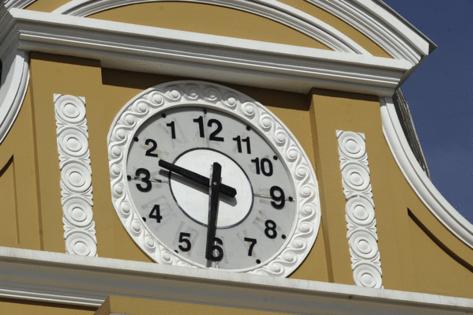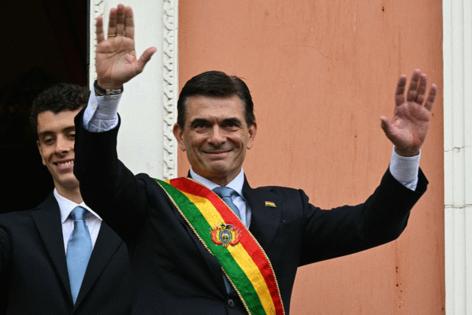A clock running clockwise marks end of leftist regime in Bolivia
Published in News & Features
LA PAZ, Bolivia — After two decades of almost uninterrupted socialist governments that struggled to set the economy on a sustainable path, Bolivians are waking up to a new reality.
Long lines at gasoline stations are disappearing. The currency has surged in unofficial markets, and bond investors are taking a more optimistic view of the country’s creditworthiness. The new government is promising to strengthen ties with the U.S. and its allies in the region, while cutting red tape, simplifying taxes and reducing trade barriers to attract businesses.
Perhaps the most symbolic of all the changes during the first days of President Rodrigo Paz’s administration is the clock that sits on top of Bolivia’s congressional building. Eleven years ago, the government rearranged the numbers and overhauled its inner workings so that its hands traveled in reverse — touted as an anti-colonialist “clock of the south.” This week, it has been restored to look and operate normally.
The promise of change is spurring cautious optimism among Bolivians who voted for the pro-business Paz in this year’s elections, rejecting the Movement Toward Socialism, or MAS, party that has dominated politics since former President Evo Morales took office in 2006 promising to lift up the poor. Still, analysts warn that deeper reforms will take time to implement, and opposition to Paz’s pro-U.S. stance is already emerging, while internal conflicts also pose a threat.
At Paz’s Nov. 8 inauguration, the new president took his oath of office with a hand on the Bible, a custom mostly abandoned in 2009 when Bolivia declared itself a secular state. Leaders from Argentina, Chile, Uruguay, Paraguay and Ecuador attended the ceremony, alongside more than 50 international delegations, and Paz stressed that Bolivia is reopening to the world after years of isolation.
The new government is rebuilding ties with the U.S., severed during the MAS years, when the government allied itself with China, Russia, Iran, Venezuela and Cuba. Already, the U.S. has announced accords on nuclear cooperation, investment and security, paving the way for a return of the U.S. Drug Enforcement Administration, which Morales expelled in 2008. The idea has stirred discontent among rural groups that represent farmers of coca, the raw ingredient for cocaine, who have been aligned with Morales.
The administration has signaled it’s open to allowing Elon Musk’s Starlink to operate in Bolivia after a license was denied in 2024. Meanwhile, a Cabinet restructuring is underway, merging some ministries for the sake of efficiency while creating a new Tourism Ministry aimed at attracting fresh foreign currency.
That would help support the boliviano, which in May fell to as low as 20 per dollar in parallel markets used to skirt controls. It’s now strengthened to 10 per dollar in unofficial trading, though it’s still significantly weaker than its official rate of 6.9 bolivianos per dollar. The government has said it plans to unify the exchange rate into a single, market-driven system.
Bolivia’s sovereign bonds have gained about 5 cents on the dollar since Paz won the second-round election Oct. 19, with notes due in 2030 now trading at about 88 cents. While investors are waiting for more concrete economic measures and doubts linger over the government’s plan on external debt, they see “a strong willingness from multilateral agencies to engage with” Paz’s administration, according to Bruno Gennari, a strategist at KNG Securities in London.
Of course, challenges remain in one of the poorest countries in the Western Hemisphere, where seven out of 10 people either live in poverty or are considered vulnerable to falling into poverty. Paz’s political party tried to broaden its appeal to poorer and working-class groups that historically have supported MAS, partly through TikTok videos from the newly elected vice president, Edmand Lara, who has since complained that Paz has tried to exclude him from Cabinet meetings.
Sara Padilla, who sells car batteries in the administrative capital La Paz, said she’s hopeful for the future, though wary of the challenges ahead.
“We have to be patient and wait for the changes we need,” Padilla said. “We’ve already gone through tough times with food shortages and rising prices. It won’t be easy, but it’s not impossible.”
Fuel subsidies, which cost the government about $2 billion annually, and declining gas production have strained public finances. Paz, who campaigned on phasing out subsidies, said cuts will be gradual and accompanied by protections for vulnerable sectors.
Amid a sharp decline in foreign reserves, a growing fiscal deficit and the drop in natural gas output, Bolivians for the most part understand changes are needed and would respond favorably to policies that are transparent and consistent, according to Claudia Pacheco, an economist at the Catholic University in Santa Cruz.
“People must be patient, because fixing an economic collapse of such magnitude and 20 years of mismanagement can’t be done in a year, it can’t be done in just a few months,” Pacheco said.
In Bolivia’s cities, long lines for gasoline because of fuel shortages have mostly disappeared as the new government works to bolster supplies, while diesel purchases are still more problematic. Energy Minister Mauricio Medinaceli has pledged to fix things soon by seeking credit lines with traders and multilateral lenders.
While reducing fuel shortages was a positive step, structural reforms will take time to implement, according to Fernando Romero, a former president of the Economics Association of Tarija.
The government plans to introduce bills in the coming months to attract foreign investment in mining, hydrocarbons, lithium and infrastructure. With a majority in Congress and emerging alliances with opposition parties, Paz may have enough support to push through his economic overhaul. At least for now.
(Zijia Song contributed to this report.)
©2025 Bloomberg L.P. Visit bloomberg.com. Distributed by Tribune Content Agency, LLC.










Comments